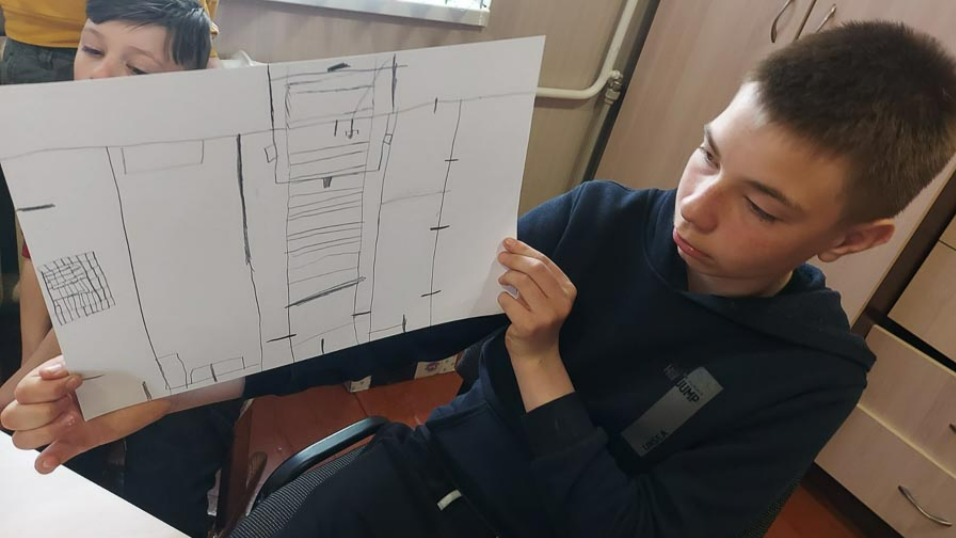At four in the morning, Oleksandr’s mother enters his room and says: “You shouldn’t go to school today because the war has come.” Thirteen- year-old Oleksandr is then forced, like so many other children in Ukraine, to experience the trauma of war up close.
The day before the war broke out, Oleksandr and his classmates learned how to evacuate and where to hide if something happened. They all felt that something was in the air. The teachers were tense and the students understood that everything was not as usual.
That same evening, Oleksandr and his friends saw several fire engines and ambulances with flashing lights speeding towards Kiev. They wondered why so many cars were going there at once.
All hell breaks loose
The night before the war was calm, but the next morning a new reality began for Oleksandr and his family. “On 24 February, I was scared and surprised at the same time, but I did as my parents said. My father went to the local defense. Five planes flew through our city on the first day. They flew quite low and sounded very loud.”
Oleksandr says that the next three days were quiet. Then hell began. “On the fourth day, they started shooting from everywhere. We were told that it came from machine guns and drones and that our military was destroying Russian tanks. We hid in the basement during the shelling. It was cold and damp and we later we all caught colds. The only time we went up to the house was in the morning to watch TV.”
One day when the family was watching TV the picture suddenly disappeared. The Russian forces had destroyed all the TV towers in the city. When the TV no longer worked, Oleksandr and his family had to listen to the radio instead to keep up with the news reporting.
“We sat in the basement almost the entire time. First the water disappeared, then all contact with the outside world. Finally the light also disappeared. Everything disappeared. We sat in the dark and the cold. We never left the house. I was very scared” he says.
The house was very cold because the heating no longer worked. The family decided to move in with Oleksandr’s grandmother who had a gas boiler. They stayed there for 11 days before shots were fired. “We ran out of my grandmother’s house in a panic. Red balls flew over us, hot and glowing, we saw them above our heads,” describes Oleksandr.

A family evacuates
One day they hear a loud siren followed by a deafening roar. “We came out and saw a five-story house, near my grandmother’s house, which no longer had a roof. There were injured and dead people on the ground, everything around the house was on fire. We also saw how a helicopter had been shot down and the whole of Makariv was lit up.
“Then we sat in the basement all night. I remember my father saying ‘If we survive this night, we will evacuate you tomorrow’. We listened to the radio and waited for the evacuation announcement,” says Oleksandr.
When evacuation orders were issued, the family packed their essentials and left their home, narrowly missing gunfire. Oleksandr says: “We bent down and hid for a long time. There was a tank further away aiming at us. Then it aimed in another direction and we continued.”
The last time Oleksandr saw his father was at the evacuation site. “My father left to save other people, and we stayed in the cultural center with people who were waiting to be evacuated. Buses started coming to pick us up, but only women and children were allowed to go with them. My brother had to stay.
Dreaming of being at home again
The bus takes Oleksandr and his mother to a refugee center in Rozhyshche, Volyn Oblast. Oleksandr The other survivors are living in constant fear, with every sound making them flinch, constantly prepared for bombing. Oleksandr is diagnosed with severe post-traumatic stress disorder (PTSD) by a psychologist working at the center.
“It was a little uncomfortable at first to participate in the therapy, but then I got used to it. Now I know how to calm myself down. I enjoy meeting new people and drawing. Before, I often talked about what I had been through, but now I remember less of it,” says Oleksandr.
After two months of therapy at the center, Oleksandr’s symptoms of acute stress have decreased. Gradually he has started to feel safe, made new friends, and is sleeping better. He has also been able to talk to his father, who remains in his hometown and is assisting with humanitarian aid efforts, while trying to repair the damage to the family’s house. He recently told Oleksandr that it might be possible to return home soon.
“There are many who do not have their houses left. Parts of my house are destroyed, but my moped and my PlayStation have made it!”
Oleksandr says that he really wants to go home, even though he knows that the war is not yet over. In his hometown there are over 1,000 mines deployed. “After the war, my dream is to go for a ride with my moped just like before.”
Learn more about how ChildFund Alliance members are supporting children and families in Ukraine
